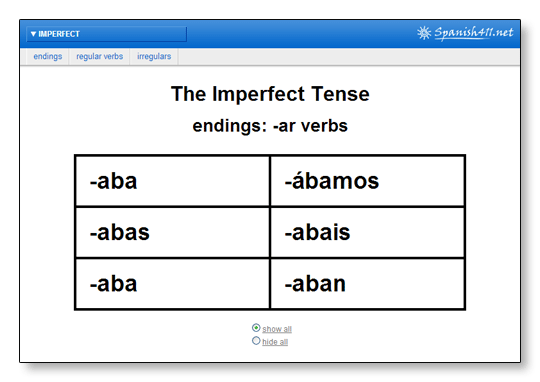|
|||||||||||||||||||||||||||||||||||||||||||||||||||||||||||
 |
|||||||||||||||||||||||||||||||||||||||||||||||||||||||||||
 |
|||||||||||||||||||||||||||||||||||||||||||||||||||||||||||
The Imperfect Tense
See also: Using the Imperfect and the Preterite The Imperfect Tense is one of two ways to talk about events that happened in the past in Spanish. The imperfect is used to:
For example: Usualmente él llegaba a la escuela temprano. Yo dibujaba mientras que ella pintaba. La ciudad era vieja y sucia. Isabel tenía ocho años. For more on when to use the Imperfect Tense, see Using the Imperfect and the Preterite. To learn how to conjugate in the imperfect tense, keep reading: Regular Imperfect Tense VerbsThe imperfect happens to be one of the easiest tenses to conjugate in Spanish; to conjugate “-ar” verbs, take off the ending and add the following: “-ar” endings:
This can lead to some rather funny sounding conjugations like trabajaba. Note that there’s only one accent mark and it occurs in the nosotros form. To conjugate “-er” and “-ir” verbs take off the endings and add the following: “-er” / “-ir” endings:
Notice that there is an accented “i” in every conjugation. Here are some examples: hablar:
comer:
vivir:
 Let’s practice! Conjugate regular imperfect tense verbs on ¡Practiquemos! Irregular Imperfect Tense VerbsThere are only three irregular imperfect conjugations in the entire Spanish language and they are ir, ser, and ver. IrIr means “to go,” and its conjugations sort of look like a hybrid between “-ar” and “-er/-ir” endings:
Please notice that these are full conjugations, not just endings. SerSer means “to be,” and it’s conjugations are totally irregular:
VerVer
means “to see” or “to watch.” At first glance it may not look
irregular; it has the regular endings for
 Let’s practice! Regular and irregular imperfect tense verbs on ¡Practiquemos! |
|||||||||||||||||||||||||||||||||||||||||||||||||||||||||||
 This work by Spanish411.net is licensed under a Creative Commons Attribution-NonCommercial-ShareAlike 4.0 International License. This work by Spanish411.net is licensed under a Creative Commons Attribution-NonCommercial-ShareAlike 4.0 International License. |

